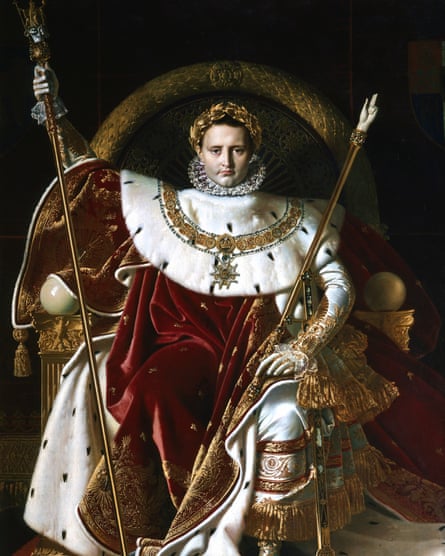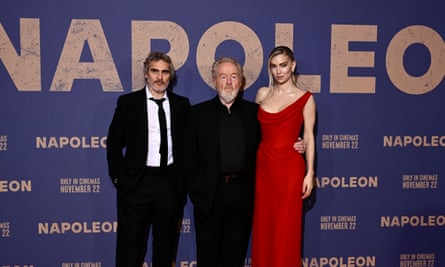A Hollywood war epic about the world’s most famous Frenchman – directed by an Englishman – was bound to contain its share of historical inaccuracies. So Ridley Scott’s big-budget battle extravaganza, Napoleon, which opens worldwide next week, has inevitably seen every aspect of its trailers scrutinised in France.
From the age of the actors (Joaquin Phoenix is older than the military leader he plays and Vanessa Kirby is younger than his wife, Joséphine), to a scene in which Napoleon’s cannons fire at the Egyptian pyramids when in reality his troops were kilometres away, nothing has escaped.
But, far from shunning the Hollywood treatment, French historians, film clubs and Napoleonic re-enactment societies are embracing the film as an opportunity to address Napoleon’s controversial story and make history accessible to a wider audience.
Scores of sold-out special screenings will be held across France, with hosts and audiences dressed in period costume, and historians leading debates and dissecting the film.
Since the 200th anniversary of Napoleon Bonaparte’s death two years ago, when Emmanuel Macron told France the emperor “is part of us”, there has been renewed discussion about Napoleon’s legacy.
While some see a military leader and political strategist who laid the foundations for the French administration, others view him as a warmongering tyrant who reintroduced slavery that had been banned after the revolution.
“This new film by a non-French director is interesting in what it may reflect about our society today,” said Pierre Czertow, a co-founder of the history association Histoire d’en Parler, which will hold a debate about the film in Épinal in eastern France next week.
“Napoleon remains an important French figure, and like a lot of 19th-century figures in France, he’s complicated,” he said. “We’re interested in looking beyond that historic figure to the notion of his relationship to the people, in France and in Europe.
“In France, it has always been complex, with a debate in recent years over whether he should be put forward under a positive light, in terms of political advances, or whether the focus should be on the other side – aspects such as rules on slavery or Jewish people. It’s for historians to shed light on that complexity.”
Napoleon restored slavery in 1802 and attempted to crush the republic of former slaves established by the Haitian hero Toussaint L’Ouverture. In 1808, decrees were published putting in place special rules for Jewish people, and Napoleon’s attitude towards Jews and antisemitism continues to be discussed by historians.
Frédéric Couvert, president of the Napoleonic Society of Aix-en-Provence, said he was embracing the Hollywood blockbuster as “entertainment against a historic backdrop” – portraying a figure who was the “most famous French person in the world, better known than even Charles de Gaulle or Louis XIV”.
He will co-host a costumed event for the film with military drummers in Napoleonic uniforms and a historians’ debate, with almost all the 400 tickets sold out and said Napoleon had won a final non-military battle: “The battle of memory and how he would be remembered.”
Jean Arida, of the Napoleonic society of Compiègne, who will be part of a group of men and women dressed in Napoleonic costume at a special film screening with a historians’ debate, exhibition of historic artefacts and imperial throne for selfies, said he thought the film would boost the work of Napoleonic re-enactment groups.
“Every time we do a re-enactment, there is so much interest from families and children – it’s like time travel,” he said.
after newsletter promotion

Events are also planned in Belgium. The Wellington museum in Waterloo has teamed up with a local cinema for a costumed cocktail party and historians’ debate at a screening next week which sold out in four days.
Quentin Debbaudt, the museum’s scientific director, said the film was a great opportunity to debate the myth and reality of Napoleon, to delve into what was real and what was exaggerated.
He said: “Napoleon himself on St Helena wanted to write his own legend and transform history, and in a way Ridley Scott is doing the same thing in transforming Napoleon’s story on film.
“As a museum, we always distinguish between the Napoleonic legend, the romanticised story of Napoleon, and the scientific history of the era, which is something different. It was Napoleon himself who started writing the legend.”
He said there was huge interest in Napoleon in the US and Asia because he was a figure who transcended his social status.
“Even if you look at the art market, you have lots of objects which belonged to Napoleon that are sold each year – one of the biggest was a South Korean collector who paid €1.9m [£1.65m] for a [two-pointed] hat worn by Napoleon.”
Debbaudt said museums and historians should engage with the film.
“It’s an opportunity for education. Our museum has always put an emphasis on pop culture, we’re not just a place to store old things – this film will have an impact on society so we have a role to play in analysing it.”
Napoleon will open in cinemas in the US, the UK and France on 22 November and in Australia on 23 November.

